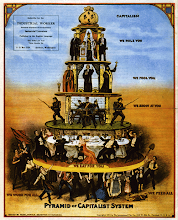Ahh heck, I just want to keep this blog active, and its going to be tough in the next few weeks due to the move back to my home state and a new job (sort of). (Yippee!)
A few months ago I had an email exchange with a Tea Party activist, Jim. The discussion began in the comments section of a post at the Rationally Speaking blog, and then we carried it into an email exchange. I figured why not make a blog post out of it. This is the lesson I gave that Jim in "Socialism":
Jim,
I am glad you asked this question about me being a socialist and sharing your concern about our road to "serfdom". You seem to think this is a contradiction? Well not neccessarily if you keep in mind my operating definition of socialist, which is a movement of workers for workers.
It has been a long time since I read Hayek's book, but I recall the jest of it. You do know of course that Hayek did not invent the term "serfdom"? And you also realize that he was making predictions that the Labor government in Britian, after implementing welfare state reforms, would eventually become totalitarian. None of this happened.
Its ironic that Hayek used the term "serfdom" because the original meaning of the word was in reference to the class positions of serfs under the social system of fuedalism. Basically, a hereditary lords or nobles owned vast properties, and the serfs would farm this land, keeping a subsistence for themselves, and paying tribute to the lord in labor and produce.
According to Hayek and your analogy of "serfdom" the government plays the role of the lord, who collects taxes from the serf.
However, doesn't capitalism mimic this fuedal system in many ways, (yet with important differences)? In capitalism, relatively few people own productive wealth and resources (i.e. land, factories, capital etc.), just as nobles owned landed estates in fuedalism. To gain access to productive land serfs had to attach themselves to the estate of a lord and turn over the products of their labor to him. In capitalism, the majority of people don't own productive wealth, so they must sell their labor power to the owner of capital.
From this arrangement, workers get a wage, but have few rights to what they produce. Of course the apologist for capitalism claims that this is right and just arrangement, as the capitalist owns the factories, invests the capital etc. But as I argued in the thread on Ayn Rand, this accumulated capital is the result of previously exploited labor.
Jim, I must give you credit for something. I was struck by your previous mention in the Rand thread of the fact that your salary on Gillette's production line is paid for in a short few minutes of the work day. Do you realize that this very point is also made in Marx's critique of capitalism, in vol. 1 of Capital? The work you do in a few minutes pays your salary, then you proceed to work 7.5 hours more, the product of which is profit for the company, theirs, not yours.
So if we are to make an analogy with "serfdom" to how things are today, why simply focus on "big government" as the sole culptrit? Shouldn''t we also consider the hugely disproportionate concentration of wealth and income of the top 1-3% of the population? While at the same time it gets harder to make a living for average working people?
You have voiced your concerns about the dissapearing prosperity for America's working middle-class. On that we AGREE. But this economic hardship is not soley due to "big government" and taxes. I really wonder why "Tea Party Patriots" don't seem to have a problem with corporations undermining America's industrial and manufacturing base by moving production overseas?
All social-economic systems are based on mutually interdependent relationships, and the production of surplus. So the question is how is the socially produced product is distributed? I think capitalism distributes the socially produced surplus very poorly, unjustly and ultimately inefficiantly.
Subscribe to:
Post Comments (Atom)




No comments:
Post a Comment